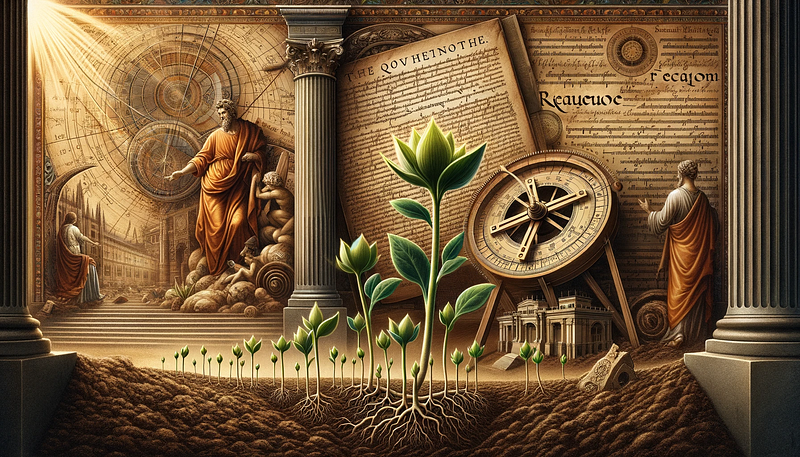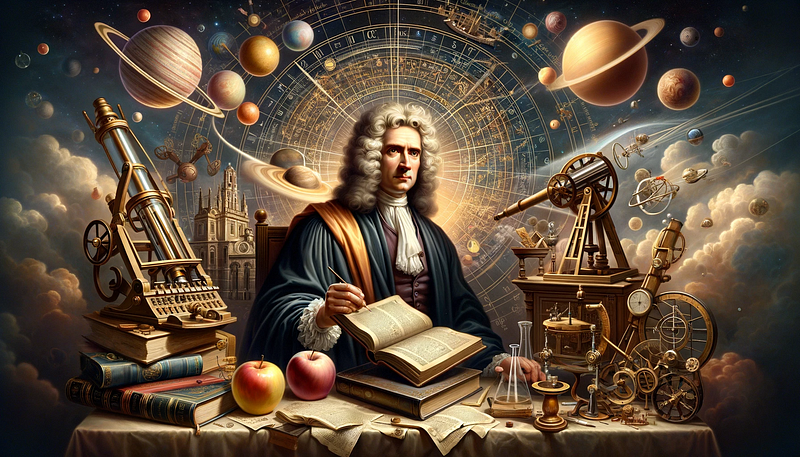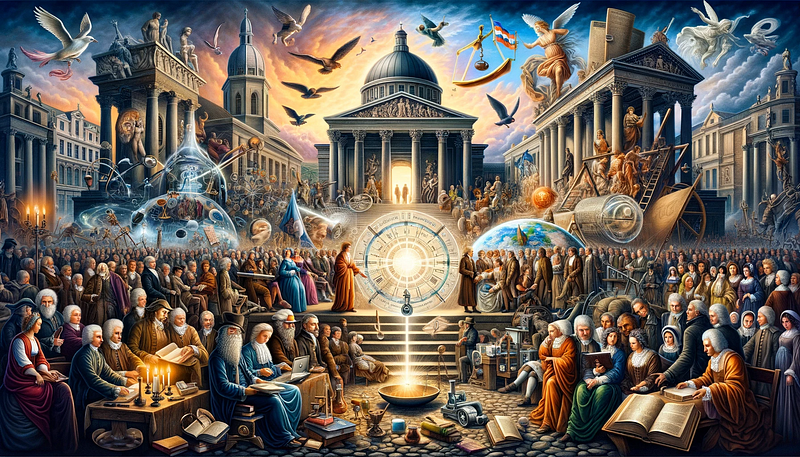The Age of Enlightenment: A Profound Intellectual Shift
Written on
Chapter 1: Introduction to the Enlightenment
The Age of Enlightenment stands as a pivotal chapter in the history of human thought, emerging as a transformative movement that altered the realm of ideas and values. Spanning from the late 17th to the 18th century, this period transcended geographical barriers, impacting Europe and eventually the globe. Its influence resonates today, forming the backbone of contemporary philosophy, scientific reasoning, and political ideologies.
Often dubbed the ‘Age of Reason,’ the Enlightenment was marked by an unprecedented belief in the power of knowledge and rational thought. Intellectuals began to challenge traditional doctrines, advocating for a new method of understanding the world—one grounded in observation, logic, and scientific inquiry rather than blind faith or superstition. This era represented a notable departure from the mysticism and religious dominance of the Middle Ages, transitioning towards a focus on reason and empirical evidence.
In this exploration of the Enlightenment, we will examine its historical context, the revolutionary ideas it introduced, its significant effects on various fields like science, politics, and culture, and ultimately, its enduring legacy that continues to shape our lives.
Historical Context of the Enlightenment
The roots of the Enlightenment can be traced back to a fertile landscape enriched by developments in preceding centuries. The Renaissance, with its resurgence of interest in the arts and sciences, along with the Scientific Revolution, had begun to dismantle the rigid frameworks of medieval thought. During this time, Europe was evolving into a collection of emerging nation-states, marked by significant technological advancements and an expanding worldview due to exploration and trade.

This period experienced a gradual transition from feudal societies to more centralized forms of governance. The rise of absolutism, while seemingly at odds with Enlightenment ideals, inadvertently provided the stability necessary for intellectual endeavors. Concurrently, the Protestant Reformation had challenged the authority of the Catholic Church, fostering an environment where questioning established norms became increasingly acceptable.
Thus, the Enlightenment did not arise in isolation; it was a culmination of these evolving changes—a response to the desire for a more rational and humane society. As we delve into the core of this period, it is vital to acknowledge this historical backdrop, as it significantly influenced the thoughts and works of Enlightenment philosophers.
Key Philosophies and Theories
At the heart of the Enlightenment lay a constellation of ideas and philosophies that have become foundational to modern thought. Rationalism, defined as the belief in reason as the primary source of knowledge, was a prominent feature. Empiricism also gained traction, emphasizing observation and experience over innate ideas. Together, these perspectives cultivated a scientific approach to understanding the world.
Influential figures such as Voltaire advocated for religious tolerance and critiqued dogmatism and superstition. Meanwhile, Jean-Jacques Rousseau introduced concepts of personal freedom and social contracts that significantly impacted political theory. Immanuel Kant, with his call to ‘Dare to know,’ encouraged individuals to think independently, without reliance on others.
These philosophers, among many others, challenged established authorities of church and state, championing individual rights and freedoms. Their ideas laid the groundwork for contemporary democracy, ethical reasoning, and educational frameworks, creating a ripple effect that influenced both their peers and future generations.
Impact on Science and Technological Advancement
The Enlightenment was a remarkable era for science and technology, characterized by the refinement and systematization of scientific inquiry. This period witnessed groundbreaking discoveries and innovations, with figures like Isaac Newton revolutionizing the field of physics through his laws of motion and universal gravitation.

These advancements were not limited to theoretical science; practical applications flourished, leading to improvements in agriculture, manufacturing, and transportation. The spirit of inquiry and experimentation that defined this era laid the groundwork for the Industrial Revolution and the modern technological landscape.
Furthermore, the Enlightenment’s emphasis on empirical evidence and the scientific method helped dispel numerous superstitions and myths, fostering a culture where knowledge was derived from rational analysis rather than inherited beliefs.
Political and Societal Transformations
The political landscape underwent some of the most visible transformations during the Enlightenment. Thinkers like John Locke and Montesquieu proposed governance ideas that significantly influenced the formation of modern political systems. Concepts such as the separation of powers, the social contract, and individual rights were revolutionary, challenging the divine right of kings and established hierarchies.

These ideas found their most dramatic expression in the American and French Revolutions. Documents like the Declaration of Independence and the French Declaration of the Rights of Man and the Citizen drew inspiration from Enlightenment principles, emphasizing liberty, equality, and fraternity.
On a societal level, the Enlightenment facilitated a shift away from feudal structures towards more egalitarian communities. While it did not immediately dismantle existing class systems, it sowed the seeds for future social reforms and movements advocating for equality and human rights.
Cultural and Artistic Developments
The Enlightenment also profoundly impacted culture and the arts. Literature flourished, with authors like Voltaire and Daniel Defoe employing satire and realism to critique societal norms and politics. In music, composers such as Wolfgang Amadeus Mozart broke free from strict conventions, introducing greater emotional expression and individualism in their works.
This era also saw the rise of the novel as a literary form, reflecting the Enlightenment’s focus on individual experience and psychological depth. The arts became not only a source of entertainment but also a medium for disseminating Enlightenment ideas, often encapsulating the era’s spirit of inquiry and exploration.
Enduring Legacy and Contemporary Significance
The legacy of the Enlightenment is vast and enduring, laying the groundwork for modern science, politics, and philosophy. The commitment to reason and empirical evidence remains a cornerstone of contemporary thought, influencing everything from governance to educational frameworks.
Today’s concepts of human rights, equality, and freedom can be traced back to this remarkable period. The Enlightenment’s spirit of inquiry and skepticism continues to inspire progress and innovation, reminding us of the power of human intellect and the necessity of challenging established norms.

As we reflect on the Age of Enlightenment, it becomes clear that it was not merely a historical phase but a significant transformation in our understanding and engagement with the world. It marked a pivotal moment when humanity embraced reason and science, setting the stage for the modern era. The ideas and principles born from the Enlightenment continue to guide us, reminding us of our capacity to evolve, question, and comprehend the complexities of our environment.
The first video titled "Essential Enlightenment: What was the Enlightenment?" provides an overview of the key concepts and figures of this transformative period, shedding light on its significance in shaping modern thought.
The second video titled "The Enlightenment: Crash Course European History #18" offers a more in-depth look into the Enlightenment's impact on history, politics, and society, illustrating its lasting relevance.
Thank you for reading! If you appreciate my writing, please consider following and subscribing, so I can continue to create engaging content. Your support means a lot!
Subscribe for Email Alerts on Future Posts. Did you enjoy this article? Please clap for it (50 claps) to help share it. Feel free to share this story on social media and consider joining the Medium Membership Program for just $5 a month to support writers like me in producing quality content.